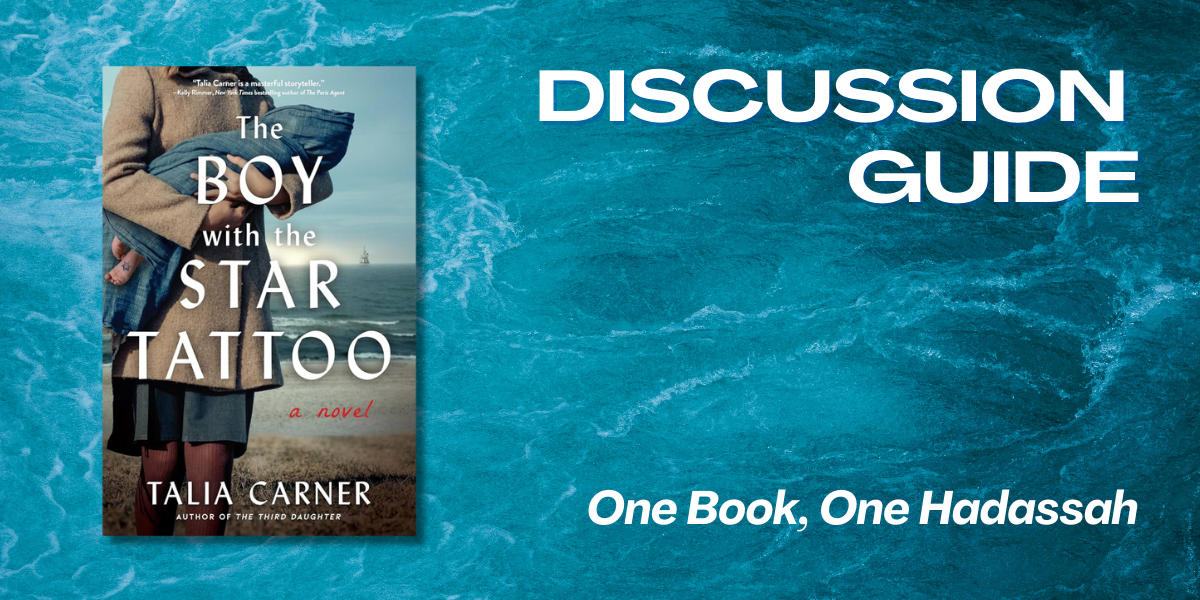Books
One Book, One Hadassah: ‘The Boy with the Star Tattoo’

“To be a Jewish woman is not to accept defeat.” —The Boy with the Star Tattoo
Israeli-born master storyteller Talia Carner’s new historical fiction, The Boy with the Star Tattoo, is set largely in France and weaves together three stories set in different times. There is a Holocaust-era tale of a disabled young pregnant French women, the search for Jewish orphans hidden in Christian homes by Youth Aliyah immediately after the Holocaust and the daring Cherbourg Project, a clandestine 1960s Israeli mission to recover ships commissioned by Israel and held up by a French arms embargo.
The tense and enthralling tales highlight little-known moments in France and Israel’s history and the resilience and heroism of the women and men who founded and sustained the Jewish state.
Local book groups are a vital part of Hadassah for many members. If your chapter doesn’t already have one, now’s the time to start! We encourage groups to have their own discussions about The Boy with the Star Tattoo before or after watching the virtual interview with the author. To facilitate those discussions, we present the following discussion guide.
- Among the reasons that Sharon Bloomenthal, one of the novel’s main characters, accepts a position with the Israeli clandestine mission in Cherbourg is to begin a quest to learn something—anything—about her late mother. Discuss the psychological reasons for her quest and the turning points in Sharon’s journey.
- What is your impression of Israeli naval officer Danny Yarden’s refusal to dwell on the past—either his own or the Holocaust—even as, he says, he neither “forgets nor forgives?” Discuss his approach from the perspective of time, from the immediate aftermath of the Holocaust to the late 1960s and even today, 80 years after the devastation.
- Félix Amiot, a real-life French industrialist who sold arms to the Nazis, is a controversial figure. In the novel he is called a “former anti-Semite” by the Israelis stationed in Cherbourg. Discuss his complex history. Is he misjudged by history? Compare Sharon’s changing perception of the man to the way her friend Rochelle relates to him.
- Uzi Yarden, a kibbutznik on a mission for Youth Aliyah in France, has to make decisions about the future of the Jewish children he finds in the country. What are your opinions about his choices regarding Arthur and Eloise?
- When Uzi arrives in Marseille, he is told by a Youth Aliyah operative in the country, “We are grateful for the heroism of local people who sheltered and saved our children, often risking their own families’ lives, but it’s time. We fear for our children’s Jewish souls.” Discuss the various ways Jews, and particularly children, were helped during the war, and the postwar Jewish-French approach to these children as glimpsed in the novel.
- Many Hadassah members are familiar with Youth Aliyah due to Hadassah founder Henrietta Szold’s involvement in the organization. Reading Carner’s book, did you learn anything new about Youth Aliyah?
- The novel recounts the virulent antisemitism in the small towns and villages in wartime France as well as the relative acceptance that the Israeli Jews experience a few decades later when living in the country temporarily. Discuss how and why the attitudes of the French people may have changed toward Jews. Can you compare the changing attitudes to the rise in antisemitism today? (In fact, The Boy with the Star Tattoo itself has become embroiled in online antisemitism, including receiving negative reviews on Goodreads, an online platform for authors and readers, because of its focus on Israeli history.)
- What is your reaction to Sharon’s investigation of Danny’s background despite his repeated requests for her to stop? Do you think she should have kept her discoveries a secret? Were you surprised by his reaction to her investigation as well as her disclosure?
- Sharon is considered a valuable member of the Israeli navy’s clandestine mission in France and is told repeatedly that she is valued for her quick thinking and analysis. Nevertheless, her advice is ignored a number of times, to the detriment of the mission. What do you think the author is implying by including these moments?
- How does Claudette Pelletier’s disability impact her faith and her reactions to the events around her as well as her relationship with Isaac and Raphael Baume? Discuss her struggle with her Catholic faith as well as her wish to belong to the Jewish people. How does she navigate the consequences—and visual manifestation—of her decision
- Religious observance is seen as an annoyance, even an obstacle, to the soldiers in the Israel Defense Forces in the 1960s. How do you evaluate their attitudes toward the “Orthodox” versus those they call “Traditionalists.” How are these attitudes a reflection of the religious divide in Israel today?
- The Boy with the Star Tattoo touches on questions of faith, religion and Jewish identity in its three intertwined stories. Discuss how Sharon, Uzi and Danny view their Jewish identity. How do questions of Jewish and/or Israeli identities impact the minor characters in this novel: Rochelle, Raphaël, Isaac, Sharon’s grandmother and Madame Galvin? Do they view their connection as religious, ethnic or secular?








 Facebook
Facebook Instagram
Instagram Twitter
Twitter
Leave a Reply